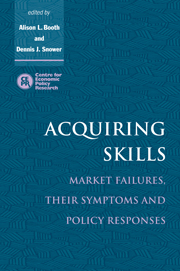Book contents
- Frontmatter
- Contents
- List of figures
- List of tables
- Preface
- List of contributors
- 1 Introduction: does the free market produce enough skills?
- Part I Market Failures: The Causes Of Skills Gaps
- 2 Transferable training and poaching externalities
- 3 Credit constraints, investment externalities and growth
- 4 Education and matching externalities
- 5 Dynamic competition for market share and the failure of the market for skilled labour
- 6 The low-skill, bad-job trap
- Part II Empirical Consequences Of Skills Gaps
- Part III Government failures and policy issues
- Index
6 - The low-skill, bad-job trap
Published online by Cambridge University Press: 16 November 2009
- Frontmatter
- Contents
- List of figures
- List of tables
- Preface
- List of contributors
- 1 Introduction: does the free market produce enough skills?
- Part I Market Failures: The Causes Of Skills Gaps
- 2 Transferable training and poaching externalities
- 3 Credit constraints, investment externalities and growth
- 4 Education and matching externalities
- 5 Dynamic competition for market share and the failure of the market for skilled labour
- 6 The low-skill, bad-job trap
- Part II Empirical Consequences Of Skills Gaps
- Part III Government failures and policy issues
- Index
Summary
This chapter analyses how a sector of an economy can fall into a low-skill, bad-job trap', characterized by a vicious cycle of low productivity, deficient training, and deficient skilled jobs, preventing the sector from competing effectively in the markets for skill-intensive products.
‘Bad-jobs’ are associated with low wages and little opportunity to accumulate human capital. They are the lot of the working poor. ‘Good jobs’ command higher wages and higher skills. The chapter argues that in sectors with a small proportion of skilled workers, firms have little incentive to provide good jobs, since such positions would be difficult to fill; but if few good jobs are available, workers have little incentive to acquire skills, since such skills would be likely to remain underutilized and consequently insufficiently remunerated.
The chapter examines the interaction between two mutually reinforcing externalities: a ‘vacancy supply externality’ and a ‘training supply externality’. The former arises when an increase in the number of skilled vacancies raises the probability that skilled workers find good jobs and thereby raises the expected return from training. Thus when a firm creates new vacancies, its private return falls short of the social return, since the latter also includes the rise in the workers' expected return from training. The ‘training supply externality’ arises when an increase in the number of skilled workers raises the probability that firms with good jobs find skilled workers and thereby raises the expected return from supplying vacancies. Thus when a worker acquires education, his private return falls short of the social return, which also includes the increase in the firms' expected gain from supplying vacancies.
- Type
- Chapter
- Information
- Acquiring SkillsMarket Failures, their Symptoms and Policy Responses, pp. 109 - 124Publisher: Cambridge University PressPrint publication year: 1996
- 27
- Cited by



